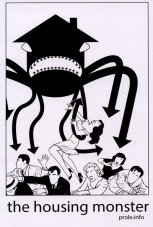- Details
- Kund*innen-Tipp
Produktbeschreibung
Carlo Cafiero (1846 - 1892) is undoubtedly one of the most important figures of the First International both in Italy, his home country, and in general throughout Europe. But this mild-mannered anarchist is all too often remembered only for some of the curious episodes in his life (his participation in the Benevento uprising, his "gift" of La Baronata to Bakunin and anarchist revolutionaries), rather than for his ideas and the enormous influence he had on the early socialist movement in Italy.
This book brings what is certainly Cafiero's most complete, original work to English-speaking audiences for the first time. It is also an extremely important work in that it is one of the earliest attempts at compiling a complete theoretical view of the revolutionary ideal of anarchist communism.
Book, 88 pages
Kund*innen, die diesen Artikel kauften, haben auch folgende Artikel bestellt:
The Housing Monster is a scathing illustrated essay that takes one seemingly simple, everyday thing—a house—and looks at the social relations that surround it. Moving from intensely personal thoughts and interactions to large-scale political and economic forces, it reads alternately like a worker’s diary, a short story, a psychology of everyday life, a historical account, an introduction to Marxist critique of political economy, and an angry flyer someone would pass you on the street.
In reality, competition between capitalist firms has never been soft, nor has international commerce been a factor of lasting peace. Contrary to common opinion (taken up before 1914 by certain socialists like Kautsky), the economic interdependence of great powers has never impeded war. Industrial and mercantile dynamism develops one zone at the expense of another, creates rival poles, each based on a territory with a State power that has military forces at its disposal.
U.a.:
- Schwerpunkt: Rassismus hat System
- Ende Gelände. Repression gegen Klimabewegung nimmt zu
- Proteste im Iran
- Deserteure
- uvm.
Zeitung, 24 Seiten
Er kämpfte gegen die „Gottlosen“ seiner Zeit: der Theologe, Pastor und Revolutionär Thomas Müntzer. Gegen Papst und Bischöfe, die die Vergebung der Sünden gegen eine schnöde Geldzahlung versprachen; gegen die Adligen und Pfaffen, die die notleidenden Bauern auspressten, um ihr Leben im Luxus zu fi nanzieren; gegen die Patrizier, die in den Städten mit ihrem wachsenden Reichtum prassten; gegen die Fürsten, denen jedes Mittel der Gewalt recht war, solange es nur dazu diente, ihre Herrschaft aufrechtzuerhalten; gegen den Reformator Martin Luther, der von der Kanzel bedingungslose Unterwerfung predigte.



















